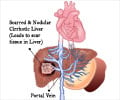Metabolic symptoms of 11 patients with the dreaded genetic condition known as Maple Syrup Urine Disease (MSUD) have been relieved after liver transplants
Metabolic symptoms of 11 patients with the dreaded genetic condition known as Maple Syrup Urine Disease (MSUD) have been relieved after liver transplants. This is the result of a study conducted by researchers from Children's Hospital of Pittsburgh and the Clinic for Special Children.
All patients from the study (ranging in age from 1-20) are alive and well with normal liver function, according to the researchers. Amino acid levels in the study patients stabilized within 6-12 hours of transplant and remained stable since transplant despite unrestricted intake of protein.MSUD is a metabolic disease which causes amino acids from proteins to accumulate in the body. The disease gets its names from the sweet smell of the urine. The accumulation of amino acids in the blood can cause metabolic crisis at any age, which can lead to brain swelling, stroke and even sudden death. Over a patient's lifetime, chronic instability of blood amino acids can result in serious learning disabilities and mental illness.
Before transplant, the only treatment was strict adherence to a diet almost devoid of protein. Despite adherence to this diet, patients were still at risk of metabolic crisis from something as simple as a common cold, which can disrupt the body's metabolism and cause rapid neurological deterioration.
In 1997, an MSUD patient at another hospital received a liver transplant due to an unrelated medical condition and physicians noticed the symptoms of her MSUD were alleviated.
Based on this serendipitous result, physicians from Children's and the Clinic for Special Children, located in Strasburg, Pa., began working collaboratively to develop a liver transplant protocol for MSUD which optimized patient safety. With a comprehensive, multidisciplinary protocol established, Children's transplant surgeons began performing liver transplants on MSUD patients in May 2004. Children's has performed 18 MSUD liver transplants since then.
The study by Children's and the Clinic for Special Children involved 11 of these MSUD patients, including the original patient. Results of the study are published in the March issue of the American Journal of Transplantation.
Advertisement
Kevin A. Strauss, MD, a pediatrician at the Clinic for Special Children and a co-author of the study, said that over the past 15-20 years, early diagnosis of MSUD followed by careful nutritional therapy have improved the health and developmental outcome of affected individuals.
Advertisement











